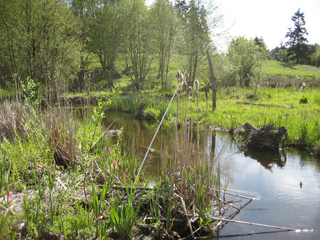
Windward Environmental
Specialty: Environmental science and engineering consulting, contaminated site investigation work, stormwater control, risk assessment, natural resource damage assessment and restoration
Management: Managing Partner Mike Johns; partners Tad Deshler, Kathy Godtfredsen, Warren Hansen, Lisa Saban and John Toll
Founded: 2000
Headquarters: Seattle
2009 revenues: $8 million
Projected 2010 revenues:
$9 million
Current projects: Superfund projects on the East Waterway of Seattle’s Harbor Island and the Passaic River in New Jersey; site investigation and other work for the Coast Guard in Alaska and the Northwest

Photo courtesy of Windward Environmental For a private client in Pierce County, Windward restored a portion of the west branch of Hylebos Creek. Work included re-aligning the creek channel to make it more salmon friendly, installing large woody debris, and planting native vegetation.
|
Windward Environmental has remained busy by engaging current clients and teaming up with project partners. The company always has done this, but it’s more of a focus this year as the economy remains sluggish.
To coordinate these efforts Windward this spring hired a marketing director, and last month the company hired an environmental engineer, geologist and an environmental chemist. Five years ago, the company had 35 staff members. Now it has 45.
“We don’t have any grand plans for hiring a lot more people this year, but that can quickly change,” said partner Tad Deshler.
One possible business source is the BP oil spill in the Gulf of Mexico. Natural resource trustees, such as American Indian tribes and the National Oceanic and Atmospheric Administration, can get monetary damages for restoring natural resources.
Permit work
Firms that are struggling are those that work on new construction projects, and many of those have been shelved.
“We don’t do so much of that so we’ve been able to weather the storm pretty well,” said Deshler.
Windward’s work is for clients and projects that require permits or government orders, such as Superfund work or other projects that can’t be deferred.
Windward is known for its in-water work, including sediment investigation. To build on that, the company five years ago began doing more upland work aimed at preventing recontamination of waterways.
“We’re getting more and more work in these areas, so I think that strategy has been paying off,” Deshler said.
In addition, Windward has been increasing its modeling capabilities. The goal is to better understand the relationship between different parts of an environment. “We have pretty sophisticated models,” Deshler said. This isn’t new technology, per se, but Windward is relying on it more often, he added.